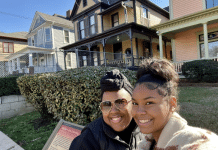Growing up, February was so important to my family because my our roots run deep. All of my grandmother’s brothers served in the military and each served during wars. My grandparents were sharecroppers in the south; they spent the days picking cotton. My grandmother even delivered two of her children in the field, rested and commenced to working later in the day. (Yes, after just having the baby). They moved north with a third grade education and created a middle class life for their family. My grandparents lived through grandchildren, loss, the death of Dr. Martin Luther King Jr, and the election of the first black President, Barack Obama. For all intents and purposes, I am painfully proud of where I come from and the people whose shoulders I stand upon. My family has always taken extra concessions for the month of February such as knowledge bowls, daily Black History facts, and Meet The Artist events at the library.
One evening I was reading a story to my children. It was a book about Harriet Tubman without pictures, just words. My children were enthralled. It made me think that while the month is great, why can’t we normalize Black History for 365 days a year. Our history is rich and can not be fully appreciated in just one month.
I made a declaration in my family that we will be celebrating our history 365 days a year.
This is not to say that all history is not pivotal, moving and important. I want to instill a sense of pride in my children, one that goes beyond the 28 day timeframe of Black History Month. I want to talk about revolutionaries like Huey P. Newton, gain inspiration from visionaries like Langston P. Hughes, revel in the voice of Mahlia Jackson, and realize that true change comes in surprising places from President Barack Obama.
I don’t simply want my children to live in a world where our presence and contribution is celebrated monthly instead of every single day.
I challenge everyone to do the same. Regardless of your gender, race, or religion. The more we read and learn about each other, the differences become smaller. Educating each other allows us to truly have hard conversations and that leads to healing. We need that now more than ever.








